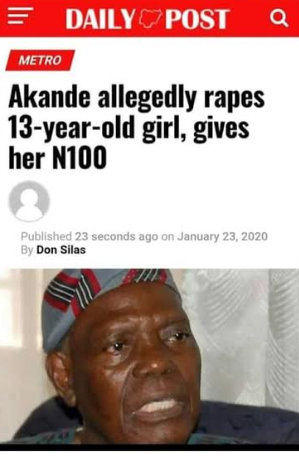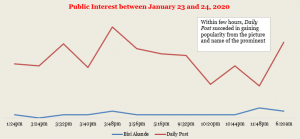
“A Magistrates’ Court sitting in Iyaganku, Ibadan, on Thursday, remanded a 35-year-old man, Sulaimon Akande, accused of defiling a 13-year-old girl. Akande of Osungbade area, Sanyo, Ibadan, was in court on a lone count charge of defilement.” That was how the journalist and editor of the story started the story that has changed Nigerians’ line of thoughts on responsible and irresponsible journalism in the last few hours on the virtual and offline spheres.
Exhibit 1: News Snippet

Our checks indicate that the story has been pulled down by the medium. It was discovered that the page in which the story was earlier domiciled has changed to “Error 404”, a popular phrase that usually came up when a post has been deleted by the owners from the backend of websites. Further check after the initial check in a space of 2 hours, a statement on the top of the medium website’s main menu reads “This page (https://dailypost.ng/2020/01/23/akande-allegedly-rapes-13-year-old-girl-gives-her-n100/) is currently offline. However, because the site uses Cloudflare’s Always Online™ technology you can continue to surf a snapshot of the site. We will keep checking in the background and, as soon as the site comes back, you will automatically be served the live version.”
Register for Tekedia Mini-MBA edition 19 (Feb 9 – May 2, 2026): big discounts for early bird.
Tekedia AI in Business Masterclass opens registrations.
Join Tekedia Capital Syndicate and co-invest in great global startups.
Register for Tekedia AI Lab: From Technical Design to Deployment (next edition begins Jan 24 2026).
Exhibit 2: Daily Post’s Gain

While conducting the checks, we discovered that the medium sought the report through the News Agency of Nigeria. Further verification shows that the report is not on the agency’s website as at the time of writing this analysis. Since the report was published with the picture (as feature image) of Chief Bisi Akande, a prominent politician in Nigeria, particularly in the South West region, professionals and public analysts have continued to discuss the medium’s action within amateurism, negligence and incompetence that have corrupted the Nigerian media space in the last decade.
On Nairaland, Nigerian social medium, a concerned citizen, says “That’s a grave error in journalism and the height of sensationalism. Using his name in the headline is bad enough, why put his picture.”
Our analyst observes that the medium’s action has further emphasised why the public would continue to lose interest in news reports as journalists and media owners linger on fielding the public information and expect them (readers) to fill in the details from their imagination. The public now have another good reason to describe Nigerian media as gutter press, media event, yellow journalism and flash & trash.
The Emerging Risks
One of the greatest risks of publishing news such as the one examined is easy consumption of falsehood and misleading information by the public, which has the tendency of fueling crisis in the society. If not because the majority of Nigerians know that Chief Bisi Akande would never involve in such act, the level of interest had about him between 1:24pm on January 23 and 6:20am on January 24, 2020 should have been enormous than what was discovered by our analyst. Throughout the world, poor reporting and bad journalism have had and still have irreversible damages in forms of reputation loss and killing of innocent.
Revisiting the Processes and Upskilling People
From the insights, it is clear that there is a need for revisiting processes being used by journalists and news media owners for news production and publication. It is also imperative to ensure adequate training for reporters and their editors towards responsible news production that left no one behind in working for mutual social and political goods in Nigeria. Teachers in universities and other higher institutions, where Mass Communication is being offered as a course, should take the advantage of the recent unbundling of the course and develop appropriate course contents capable of redirecting many journalists to responsible journalism path.
It is high time that stakeholders should use the same prism being adopted for understanding Medicines, Engineering, Law and other related courses seen as critical to society in all ramifications for Journalism and Media Studies. Students and practitioners need to acquire a broad knowledge of activities and emerging trends in journalism and media world.



